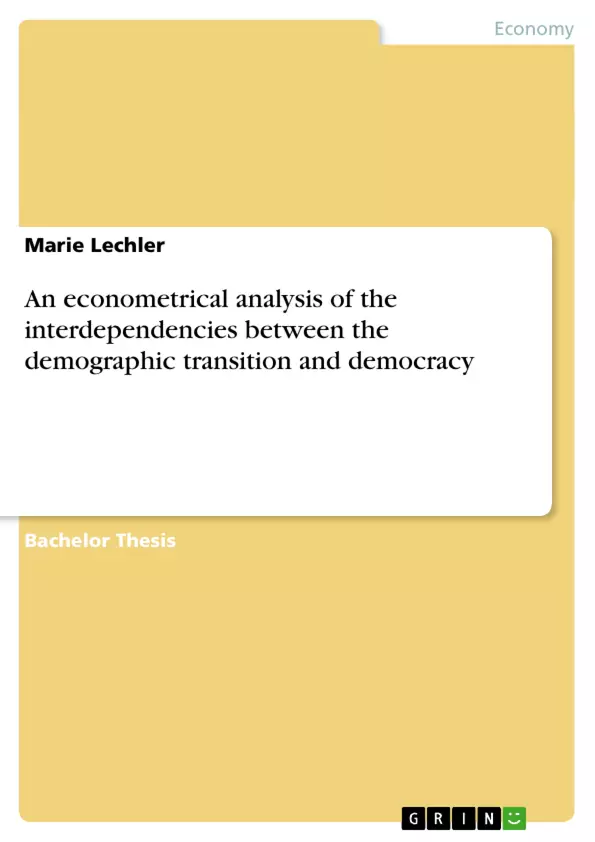This paper investigates the effect of an exogenous demographic transition on democracy. As
possible channels through which this influence makes an impact, education and per capita
income and, to a lesser degree, urbanization were identified. These interdependencies were tested
using pooled ordinary least squares as well as fixed effects models on the basis of panel data. In
conclusion, the demographic transition affects democracy through the aforementioned channels
primarily in poor countries that have experienced their demographic transition and subsequent
democratization in the second half of the 20th century or later.
Inhaltsverzeichnis (Table of Contents)
- 1. INTRODUCTION
- 2. MOTIVATING THEORY
- 2.1. THE DEMOGRAPHIC TRANSITION
- 2.2. INTERDEPENDENCIES BETWEEN THE DEMOGRAPHIC TRANSITION AND DEMOCRACY
- 2.3. DEMOCRACY
- 2.3.1. EDUCATION
- 2.3.2. URBANIZATION
- 2.3.3. WOMEN'S EMPOWERMENT
- 2.3.4. ECONOMIC GROWTH
- 3. DATA AND DESCRIPTIVE STATISTICS
- 3.1. DATA
- 3.1.1. DEMOGRAPHIC DATA
- 3.1.2. DATA ON DEMOCRACY
- 3.1.3. OTHER DATA
- 3.2. DESCRIPTIVE STATISTICS
- 3.1. DATA
- 4. EMPIRICAL ANALYSIS
- 4.1. OLS MODEL
- 4.1.1. METHODOLOGY
- 4.1.2. ANALYSIS
- 4.2. COUNTRY FIXED EFFECTS
- 4.2.1. METHODOLOGY
- 4.2.2. ANALYSIS
- 4.3. ROBUSTNESS CHECK
- 4.3.1. YEAR FIXED EFFECTS
- 4.3.2. INTERACTIONS WITH INCOME
- 4.3.3. TIME OF DEMOGRAPHIC TRANSITION
- 4.4. HOW THE DEMOGRAPHIC TRANSITION AFFECTS DEMOCRACY
- 4.4.1. LIFE EXPECTANCY AND BIRTH RATES
- 4.4.2. CHANNEL ANALYSIS
- 4.1. OLS MODEL
- 5. LIMITATIONS
Zielsetzung und Themenschwerpunkte (Objectives and Key Themes)
This paper investigates the effect of an exogenous demographic transition on democracy. The main goal is to analyze how the demographic transition influences the development of democracy through various channels, including education, per capita income, urbanization, and women's empowerment.- The influence of the demographic transition on democracy.
- The role of education and per capita income in mediating this relationship.
- The impact of urbanization on the relationship between the demographic transition and democracy.
- The significance of women's empowerment in shaping the link between the demographic transition and democracy.
- The empirical evidence on the relationship between the demographic transition and democracy in different contexts.
Zusammenfassung der Kapitel (Chapter Summaries)
- Chapter 1: Introduction provides an overview of the research question and its significance, outlining the research gap and the study's objectives.
- Chapter 2: Motivating Theory delves into the theoretical framework, discussing the concept of demographic transition, its interdependencies with democracy, and the role of various factors like education, urbanization, women's empowerment, and economic growth in shaping this relationship.
- Chapter 3: Data and Descriptive Statistics explains the data used in the study, including demographic data, data on democracy, and other relevant variables. It also presents descriptive statistics, providing insights into the characteristics of the data.
- Chapter 4: Empirical Analysis presents the econometric analysis using pooled ordinary least squares (OLS) and fixed effects models to investigate the relationship between the demographic transition and democracy. The chapter analyzes the results and discusses the findings.
- Chapter 5: Limitations discusses potential limitations of the study, acknowledging any potential biases or shortcomings in the research design and methodology.
Schlüsselwörter (Keywords)
This research focuses on the complex relationship between the demographic transition and democracy. It explores the key factors that mediate this relationship, including education, per capita income, urbanization, and women's empowerment. The study utilizes econometric methods to analyze panel data and provide empirical evidence for the impact of the demographic transition on democratization.Frequently Asked Questions
How does the demographic transition affect democracy?
The transition, characterized by falling birth and death rates, positively affects democracy primarily through channels like increased education and per capita income.
What role does education play in democratization?
Education is identified as a primary channel; as families have fewer children, they invest more in each child's education, leading to a more informed and politically active citizenry.
Does urbanization influence the link between demography and democracy?
Yes, urbanization is a secondary channel. The concentration of people in cities often facilitates political organization and the spread of democratic ideas.
Why is women's empowerment significant in this study?
Women's empowerment is both a result and a driver of demographic transition, often leading to greater social and political equality, which strengthens democratic structures.
In which countries is this effect most visible?
The study finds the strongest impact in poor countries that experienced their demographic transition and democratization in the second half of the 20th century or later.
- Quote paper
- Marie Lechler (Author), 2011, An econometrical analysis of the interdependencies between the demographic transition and democracy, Munich, GRIN Verlag, https://www.grin.com/document/208290



